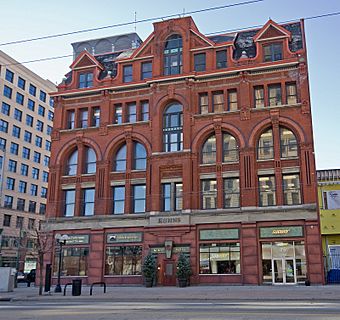Benjamin F. Kuhns Building facts for kids
Quick facts for kids |
|
|
Benjamin F. Kuhns Building
|
|

Front of the building
|
|
| Location | 43 S. Main St., Dayton, Ohio |
|---|---|
| Area | 1 acre (0.40 ha) |
| Built | 1883 |
| Architect | Peters & Burns; Beaver & Butt |
| Architectural style | Romanesque Revival |
| NRHP reference No. | 78002146 |
| Added to NRHP | April 24, 1978 |
The Benjamin F. Kuhns Building is a special historic building on Main Street in downtown Dayton, Ohio, United States. It's known for its beautiful old architecture from the late 1800s. Because it's so well-preserved, it has been recognized as a historic site.
Contents
What Makes the Kuhns Building Special?
The Benjamin F. Kuhns Building was built in 1883. It is a great example of Romanesque Revival architecture. This style uses strong, rounded arches and sturdy brickwork. The building is made of brick and has a slate roof. It also features decorative stone and terracotta details.
How Was the Building Designed?
The front of the building has five sections, called bays. Each bay features a large, rounded arch. The side of the building that faces the street is like a bigger version of these arches. The building was designed by Peters and Burns, an architectural company from Dayton. The construction was handled by local contractors, Beaver and Butt.
What Was Inside the Building?
In its early days, the Kuhns Building was home to many businesses. In the 1890s, the Manhattan Clothing Store was there. Later, in the 1910s, Oleman's Department Store operated from the building. It wasn't always just for shops, though! An arts school even used the building for classes during the 1888-1889 school year. Inside, you can find a special feature: a mail chute. Some people say it was one of the very first mail chutes ever installed in a building in the United States!
Who Was Benjamin F. Kuhns?
The building is named after Benjamin Kuhns. He moved to Dayton in 1855 when he was 30 years old. By the time he turned 50, Kuhns was a very successful businessman. He took a small company in Dayton and turned it into a major factory that made farm equipment.
Benjamin Kuhns was also a generous person. He was one of the main people who helped start Miami Valley Hospital. This shows he cared a lot about his community.
The Building's History and Recognition
The Benjamin F. Kuhns Building was added to the National Register of Historic Places in April 1978. It earned this honor because of its important and well-preserved architecture. Being on the National Register means it's a place worth protecting for its historical value.
In the early 2000s, the Kuhns Building was updated and improved. However, in 2010, the company that owned it faced financial difficulties. Like some other buildings in downtown Dayton, it went through a process where ownership changed because of unpaid loans and taxes. Today, the building remains an important part of Dayton's history.



